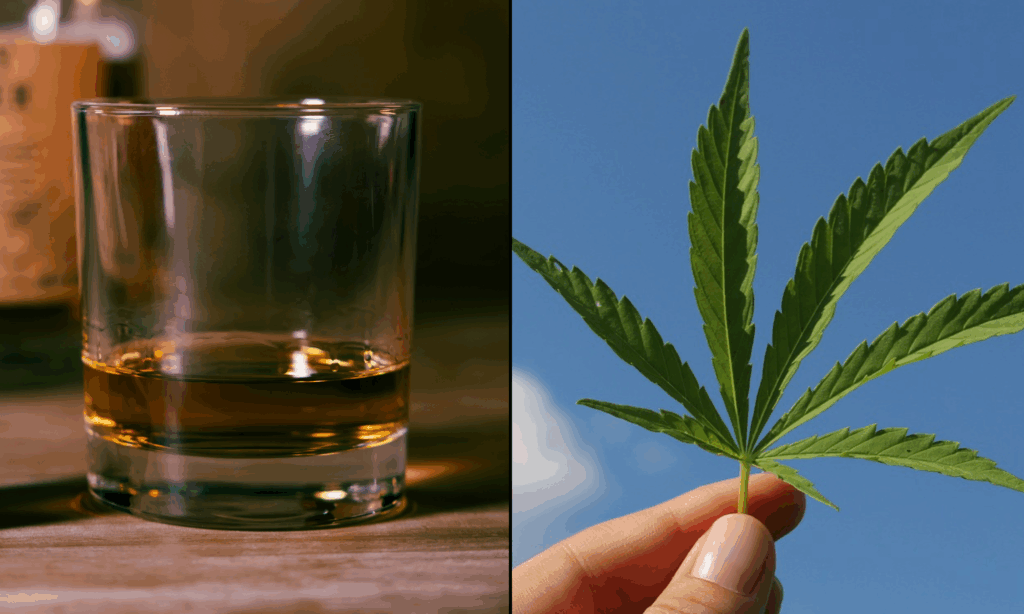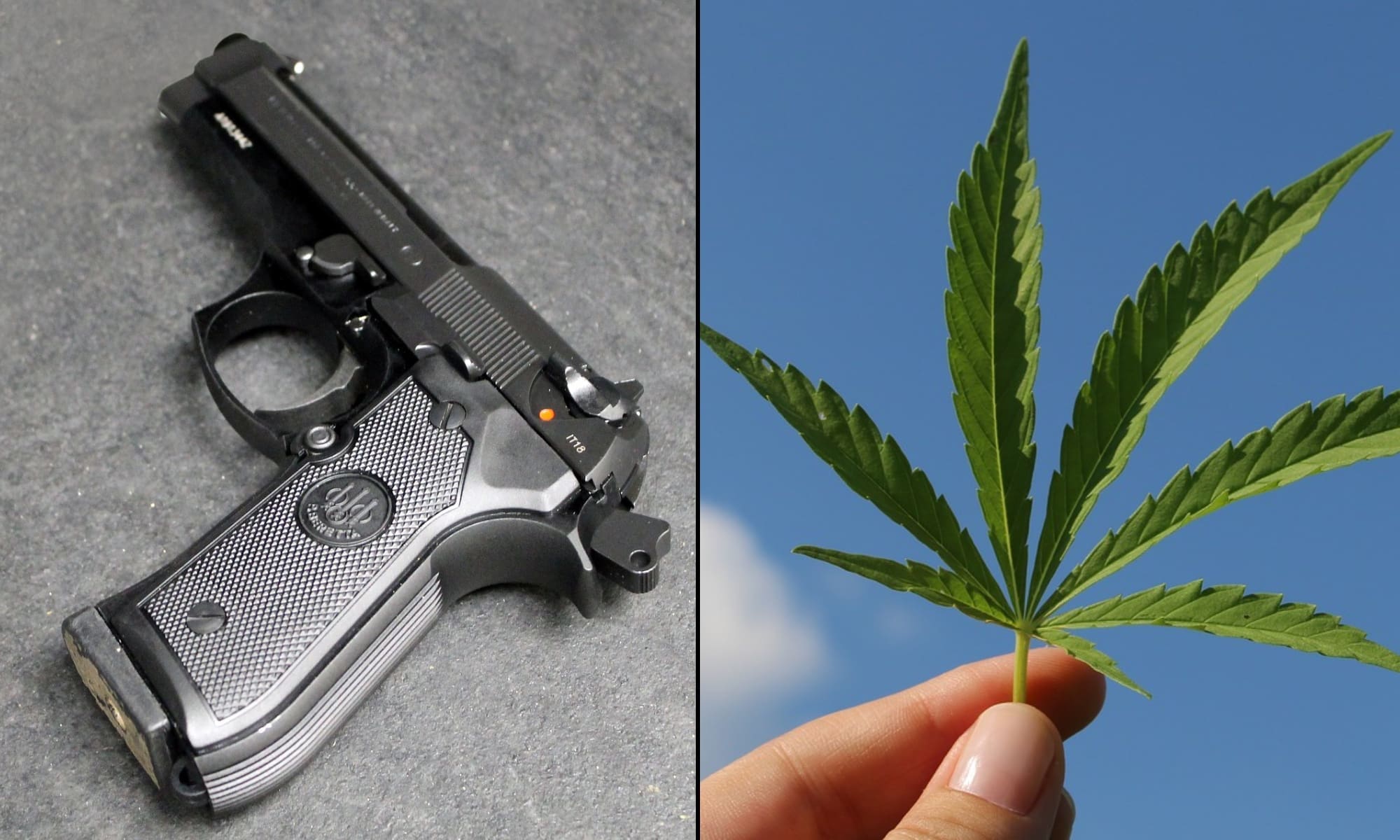featured
Whiskey Company Scales Back Operations, Citing ‘Consumer Shifts’ Toward Marijuana As Alcohol Alternative
Published
3 hours agoon

A popular independent craft spirits distillery says it’s scaling back its operations—due in part to the fact that more adults are choosing marijuana over alcohol.
Heritage Distilling Company, Inc.–which has distillery locations for its whiskey and other spirits in Oregon and Washington State where cannabis is legal—said on Thursday that a confluence of factors informed its decision to close tasting rooms, shift to contract production partnerships and focus on direct-to-consumer sales.
The company listed four specific considerations that led to the consolidation of its operations. That includes “consumer shifts toward reduced alcohol consumption and alternative products, including marijuana.”
That shift is being closely monitored across the alcohol industry. Earlier this year, the CEO of Brown-Forman Corporation, which produces brands such as Jack Daniel’s and Woodford Reserve, said that the growing use of marijuana as an alternative to alcohol is putting “pressure” on the spirits industry.
This week, new congressional lobbying reports shows that many major companies such as Anheuser-Busch, Bacardi North America and Moet Hennessy USA are engaged in federal lobbying to influence cannabis policy amid the surge in interest into THC beverages.
“For more than a decade, Heritage Distilling tasting rooms were places for friends and family to gather to enjoy each other’s company and great spirits,” Jennifer Stiefel, president of Heritage Distilling, said in a press release on Thursday. “As we head into the final stretch of the year, we wanted to give our customers and club members two months of lead time to plan their final visits to our tasting rooms, to share in great memories and to thank the staff who helped them along their customer journey.”
The company also listed tax and regulatory challenges in Oregon and Washington State as additional reasons for the business model change.
The fact that evolving consumer preferences for cannabis factored into the decision isn’t entirely surprising, as there have been many recent market analyses and surveys indicating that marijuana legalization has proved to be a disruptive force for the alcohol industry.
A poll released earlier this month found that a majority of Americans believe marijuana represents a “healthier option” than alcohol—and most also expect cannabis to be legal in all 50 states within the next five years.
Another recent survey showed that four in five adults who drink cannabis-infused beverages say they’ve reduced their alcohol intake—and more than a fifth have quit drinking alcohol altogether.
That survey was released shortly after a leading alcohol industry group added a company that makes THC-infused drinks to its membership roster for the first time, furthering signaling the cultural shift.
This also comes at a time when younger Americans are increasingly using cannabis-infused beverages as a substitute for alcohol—with one in three millennials and Gen Z workers choosing THC drinks over booze for after-work activities like happy hours, according to a new poll of 1,000 young professionals.
This month it was revealed that the retail giant Target is soft launching sales of THC-infused beverages at select stores in Minnesota.
Meanwhile, Veterans of Foreign Wars (VFW) of the United States recently entered a first-of-its-kind partnership with a hemp THC beverage company, with a licensing branding deal that will support a variety of veterans services and promote cannabis drinks as a potential alcohol alternative with the drinks being available at VFW posts across the country.
Separately, while Target is apparently moving into the THC drink space, the airline Virgin Atlantic denied satirical and false claims earlier this year from a cannabis beverage company about a deal to sell its THC-infused beverages on flights.

Author: mscannabiz.com
MScannaBIZ for all you Mississippi Cannabis News and Information.
You may like
-


Curio Wellness Acquires 4 Greenlight Dispensaries in Missouri
-


The best places to be high in Seattle
-


Colombia’s Bold Offer to Trump: Legal Weed Exports for Peace
-


Trump DOJ Asks Supreme Court For Delayed Schedule In Case On Marijuana Users’ Gun Rights
-


Smart Cannabis: The AI Revolution No Operator Can Ignore
-


New Jersey Gubernatorial Candidates Need To Step Up For Cannabis Consumers (Op-Ed)
featured
Curio Wellness Acquires 4 Greenlight Dispensaries in Missouri
Published
8 minutes agoon
October 23, 2025
[PRESS RELEASE] – TOWSON, Md., Oct. 22, 2025 – Curio Wellness, a leading U.S. cannabis brand and vertically integrated operator, has entered into a definitive agreement to acquire four high-volume retail dispensaries in Missouri operating under the Greenlight brand. The locations expand Curio’s best-in-class retail portfolio and presence in Southeast Missouri, increasing access to Curio products and experiences across the region. The transaction is expected to close following regulatory approval.
“Curio and Greenlight share a deep commitment to customer delight,” Curio Wellness CEO Michael Bronfein said. “These locations are exceptionally well operated and culturally aligned with our standards of operational excellence. Bringing them into the Curio family advances our mission to deliver trusted products, service and value – customer by customer, store by store, market by market.”
The acquisition aligns with Curio’s disciplined approach to capital allocation and national expansion. By integrating four high-performing dispensaries into its Missouri platform, Curio adds immediate scale, strengthens retail capabilities, and creates a broader stage for its innovative products. The transaction is expected to be accretive and deliver shareholder value through operational synergies, supply-chain efficiencies and increased brand adoption in a large and growing market.
“This acquisition represents an intentional step in our national strategy, building on market entries, franchise development, and brand partnerships designed for predictable results and sustainable growth,” Bronfein said.
“Working with Curio Wellness is a decision we make with confidence,” Greenlight CEO John Mueller said. “Curio’s commitment to people, product quality and community aligns with our values. We’re proud these locations will continue to thrive.”
Curio expects continued momentum in Q4 2025, including the launch of its branded products in New York through a licensing partnership with Vireo Health and the opening of a franchise location in New Jersey, enabled by Curio’s Private Equity Fund for Social Equity operators.
“As we integrate these Missouri locations and execute on our Q4 initiatives in New York and New Jersey, our focus remains clear,” Bronfein said. “We’re here to bring innovation, access and value to customers and stakeholders nationwide – responsibly, consistently and at scale.”
SSC Advisors acted as financial advisers on this transaction.

Author: mscannabiz.com
MScannaBIZ for all you Mississippi Cannabis News and Information.
featured
Colombia’s Bold Offer to Trump: Legal Weed Exports for Peace
Published
1 hour agoon
October 23, 2025
Colombian President Gustavo Petro opened a controversial new front line by proposing to U.S. President Donald Trump more than just a trade adjustment: he asked that “the export of cannabis be legalized like any other good, given its exclusion from the UN list of dangerous substances,” through a post on X.
Las guerras que Colombia vive desde hace 5 décadas, primero urbana hasta 1993, después rural, se deben al consumo de cocaína en EEUU; aunque han habido aportes de gobiernos estadounidenses a la paz de Colombia, han sigo exigüos y nulos en los últimos años.
Se ha construido una… https://t.co/R2SGZEnDfU
— Gustavo Petro (@petrogustavo) October 20, 2025
The idea is not limited to marijuana as an agricultural product, but rather, Petro ties it to a broader plan to transform Colombia’s rural economy: eliminating tariffs, opening long-term contracts for farmers in crop substitution areas, and attracting agro-industrial investments that will help farmers relocate “to fertile lands near cities and not adopt the jungle as a form of survival.”
For advocates of cannabis reform, the situation paints an intriguing picture: the proposal to bring a marginalized crop out of the underground, carve out a legitimate place for it in international trade and empower growers. But is it viable? What risks does it entail?
‘Colombia Provides the Money and the Deaths, the US Provides the Consumption’
The proposal comes in a context of diplomatic rift with the US. Trump accused Petro of being an “illegal drug leader” and announced, in a threatening tone, the suspension of aid and tariffs for Colombia — a country he repeatedly misnamed ‘Columbia.’
In response, Petro not only proposes the legalization of cannabis, but also shifts blame for Colombia’s conflict onto foreign consumption: “Colombia puts up the money and the deaths, and the US provides the consumption.”
This shift flips the traditional narrative—no longer ‘Colombia produces, the US consumes’—instead demanding the opening of legal markets to replace illicit ones, and make regulation part of the plan. He also called to “scientifically study whether prohibition is truly necessary, or whether instead a model of responsible, state-regulated consumption would be more effective.”
For cannabis reform advocates, this proposal can be seen as a historic demand: rural workers as protagonists, legal exports as an option, and public health as the focus. But the path is fraught with diplomatic, commercial, and regulatory hurdles.
Petro’s proposal has two powerful facets: on the one hand, it opens the door to viewing cannabis not as a stigma but as an economic, social, and political opportunity. On the other hand, it plunges headlong into a fierce battle: that of agricultural sovereignty, that of trade treaties, and the US role in the international War on Drugs.
Ultimately, if successful, it could pave the way for a new Latin American model for agro-industrial regulation: the countryside as the driving force, trade with the US as the platform, and cannabis as a legitimate product. If it fails, it could trigger harsher authoritarian drug-war crackdowns, strain alliances, and deepen global stigma.

Author: mscannabiz.com
MScannaBIZ for all you Mississippi Cannabis News and Information.
featured
Trump DOJ Asks Supreme Court For Delayed Schedule In Case On Marijuana Users’ Gun Rights
Published
2 hours agoon
October 23, 2025
The Justice Department is asking the U.S. Supreme Court for more time to submit briefs in a case justices recently agreed to hear that concerns the constitutionality of a federal ban on gun ownership by people who use marijuana and other drugs.
In a motion from the Trump administration that was sent to the court on Thursday, DOJ said there was mutual agreement between its attorneys and those representing the respondent in the case that the current deadline for briefs and reply briefs should be revised because of the “press of other cases.”
Currently, the Justice Department is supposed to file its first brief with the court by December 4, but it’s requesting that be extended to December 12. That would push the respondent’s deadline to submit a brief to January 20.
“If those extensions are granted, the reply brief would be due on February 19, 2026. Both parties consent to this briefing schedule,” U.S. Solicitor General D. John Sauer, an appointee of President Donald Trump, said in the motion.
The Trump administration has routinely argued that the policy restricting gun ownership by people who use cannabis, even in compliance with state law, “targets a category of persons who pose a clear danger of misusing firearm” and should be upheld.
After several years of conflicting lower court rulings on related cases, justices on Monday granted cert in U.S. v. Hemani to settle the question of whether the ban—known as Section 922(g)(3)—is consistent with the Second Amendment.
While the court on Monday also declined to take up a separate case on cannabis consumers’ gun rights, there are still several others pending a decision from the justices. But the choice to take up Hemani in particular is likely welcome news to the Justice Department, which has consistently defended the firearm prohibition and specifically requested that SCOTUS review that case instead of alternatives.
That could be related to the fact that the defendant is not only a marijuana consumer but also a user of cocaine who’s sold drugs in the past, so it’s possible DOJ reasoned that he is a less sympathetic face for the issue. Defendants in the other cases were merely found in possession of both a firearm and marijuana.
In June, the solicitor general submitted a filing with the Supreme Court that said “Section 922(g)(3) complies with the Second Amendment,” and the statute “targets a category of persons who pose a clear danger of misusing firearms: habitual users of unlawful drugs.”
The law “bars their possession of firearms only temporarily and leaves it within their power to lift the restriction at any time; anyone who stops habitually using illegal drugs can resume possessing firearms,” Sauer said.
Notably, while the government mentions “habitual” users of illegal drugs 40 times in its filing, that word does not itself appear in 922(g)(3). The language of the statute prohibits anyone “who is an unlawful user of or addicted to any controlled substance” from purchasing or possessing firearms or ammunition.
In a separate August filing for the case, the Justice Department also emphasized that “the question presented is the subject of a multi-sided and growing circuit conflict.” In seeking the court’s grant of cert, the solicitor general also noted that the defendant is a joint American and Pakistani citizen with alleged ties to Iranian entities hostile to the U.S., putting him the FBI’s radar.
Now that the Supreme Court has agreed to take up Hemani, if justices declare 922(g)(3) constitutional, such a ruling could could mean government wins in the remaining cases. The high court on Monday denied a petition for cert in U.S. v. Cooper, while leaving pending decisions on U.S. v. Daniels and U.S. v. Sam. The justices were scheduled to discuss all of the cases at a closed-door meeting last Friday.
The court also recently denied a petition for cert in another gun and marijuana case, U.S. v. Baxter, but that wasn’t especially surprising as both DOJ and the defendants advised against further pursing the matter after a lower court reinstated his conviction for being an unlawful user of a controlled substance in possession of a firearm.
A number of federal courts in recent years have cast doubt on the legality of § 922(g)(3), finding generally that while the ban on gun ownership among drug users may not be entirely unconstitutional, there’s scant historical precedent for such a broad restriction of Second Amendment rights on an entire a category of people.
Meanwhile, in recent interviews with Marijuana Moment, several Republican senators shared their views on the federal ban on gun possession by people who use marijuana—with one saying that if alcohol drinkers can lawfully buy and use firearms, the same standard should apply to cannabis consumers.
Separately, the U.S. Court of Appeals for the Tenth Circuit last month sided with a federal district court that dismissed an indictment against Jared Michael Harrison, who was charged in Oklahoma in 2022 after police discovered cannabis and a handgun in his vehicle during a traffic stop.
The case has now been remanded to that lower court, which determined that the current statute banning “unlawful” users of marijuana from possessing firearms violates the Second Amendment of the Constitution.
The lower court largely based his initial decision on an interpretation of a Supreme Court ruling in which the justices generally created a higher standard for policies that seek to impose restrictions on gun rights.
The ruling states that any such restrictions must be consistent with the historical context of the Second Amendment’s original 1791 ratification.
The historical analogues that the Justice Department relied on to make the case that the ban is consistent included references to antiquated case law preventing Catholics, loyalists, slaves and Indians from having guns.
The circuit court, for its part, said that “the government must show non-intoxicated marijuana users pose a risk of future danger” to support the current policy. “This inquiry, which may involve fact finding, is best suited for the district court.”
Meanwhile, in the U.S. Court of Appeals for the Eleventh District, judges recently ruled in favor of medical cannabis patients who want to exercise their Second Amendment rights to possess firearms.
As a recent report from the Congressional Research Service (CRS) explained the current legal landscape, a growing number of federal courts are now “finding constitutional problems in the application of at least some parts” of the firearms prohibition.
In a recent ruling, a three-judge panel for the U.S. Court of Appeals for the Eighth Circuit vacated a defendant’s conviction and remanded the case back to a district court, noting that a retrial before a jury may be necessary to determine whether cannabis in fact caused the defendant to be dangerous or pose a credible threat to others.
The Third Circuit separately said in a published opinion that district courts must make “individualized judgments” to determine whether 922(g)(3) is constitutional as applied to particular defendants.
—
Marijuana Moment is tracking hundreds of cannabis, psychedelics and drug policy bills in state legislatures and Congress this year. Patreon supporters pledging at least $25/month get access to our interactive maps, charts and hearing calendar so they don’t miss any developments.![]()
Learn more about our marijuana bill tracker and become a supporter on Patreon to get access.
—
Earlier this year, a federal judge in Rhode Island ruled that the ban was unconstitutional as applied to two defendants, writing that the government failed to establish that the “sweeping” prohibition against gun ownership by marijuana users was grounded in historical precedent.
A federal judge in El Paso separately ruled late last year that the government’s ongoing ban on gun ownership by habitual marijuana users is unconstitutional in the case of a defendant who earlier pleaded guilty to the criminal charge. The court allowed the man to withdraw the plea and ordered that the indictment against him be dismissed.
DOJ has claimed in multiple federal cases over the past several years that the statute banning cannabis consumers from owning or possessing guns is constitutional because it’s consistent with the nation’s history of disarming “dangerous” individuals.
In 2023, for example, the Justice Department told the U.S. Court of Appeals for the Third Circuit that historical precedent “comfortably” supports the restriction. Cannabis consumers with guns pose a unique danger to society, the Biden administration claimed, in part because they’re “unlikely” to store their weapon properly.
Meanwhile, some states have passed their own laws either further restricting or attempting to preserve gun rights as they relate to marijuana.
Recently a Pennsylvania lawmaker introduced a bill meant to remove state barriers to medical marijuana patients carrying firearms.
Colorado activists also attempted to qualify an initiative for November’s ballot that would have protected the Second Amendment rights of marijuana consumers in that state, but the campaign’s signature-gathering drive ultimately fell short.
As 2024 drew to a close, the ATF issued a warning to Kentucky residents that, if they choose to participate in the state’s medical marijuana program that’s set to launch imminently, they will be prohibited from buying or possessing firearms under federal law.
The official said that while people who already own firearms aren’t “expected to” turn them over if they become state-legal cannabis patients, those who “wish to follow federal law and not be in violation of it” must “make the decision to divest themselves of those firearms.”
Since then, bipartisan state lawmakers have introduced legislation that would urge Kentucky’s representatives in Congress to amend federal law to clarify that users of medical marijuana may legally possess firearms, though no action has since been taken on that bill.
Kentucky Gov. Andy Beshear (D) said in January that he supported the legislature’s effort to urge the state’s congressional delegation to call for federal reforms to protect the Second Amendment rights of medical marijuana patients, but the governor added that he’d like to see even more sweeping change on the federal level.

Author: mscannabiz.com
MScannaBIZ for all you Mississippi Cannabis News and Information.

Curio Wellness Acquires 4 Greenlight Dispensaries in Missouri

The best places to be high in Seattle

Colombia’s Bold Offer to Trump: Legal Weed Exports for Peace

Trump DOJ Asks Supreme Court For Delayed Schedule In Case On Marijuana Users’ Gun Rights

Whiskey Company Scales Back Operations, Citing ‘Consumer Shifts’ Toward Marijuana As Alcohol Alternative

Smart Cannabis: The AI Revolution No Operator Can Ignore

New Jersey Gubernatorial Candidates Need To Step Up For Cannabis Consumers (Op-Ed)

Millennials Are Spending Big on Luxury Travel

West Virginia Medical Marijuana Revenue Is Supposed To Support Drug Treatment Programs, But Sits Unspent As Officials Worry About Federal Prohibition

Frequent Marijuana Use Is Tied To Lower Risk Of Liver Disease From Alcohol, New Study Finds

Ohio bill to scale back cannabis legalization passed by House (Newsletter: October 23, 2025)

FDA Weighs Petition On ‘Significant Harm’ Of Marijuana Hair Testing Device’s Positive Results From Secondhand Smoke

Wisconsin Lawmakers Rally for Medical Cannabis Legalization in Committee Hearing

Massachusetts Campaign To Roll Back Marijuana Legalization Law Is ‘On Track’ To Make 2026 Ballot, Spokesperson Says

Village Farms Introduces Industry-First, One-Way Aroma Valve in Cannabis Packaging

Ohio House Passes Bill To Remove Voter-Approved Marijuana Legalization Protections And Restrict Hemp Market

Sorting Robotics Becomes Cannabis Manufacturing’s First True Systems Integrator

Wisconsin Senators Hold Hearing On GOP Leader’s New Medical Marijuana Legalization Bill

Tariffs And Visas Add To The Cannabis Industry’s Misery

Rhode Island Cannabis Chair Steps Down; Adult-Use Dispensary Awards Months Away

How America Accidentally Legalized Lab Cannabis

New Hampshire Lawmakers Announce Plans For Marijuana, Psychedelics And Hemp Bills For 2026 Session

Metrc Announces In-Person Events in New York to Prepare Licensees For Track-and-Trace Implementation

Top Rhode Island Marijuana Regulator Steps Down Ahead Of Possible Campaign For Attorney General

Alert: Department of Cannabis Control updates data dashboards with full data for 2023

Connecticut Appoints The US’s First Cannabis Ombudsperson – Yes there is a pun in there and I’m Sure Erin Kirk Is Going To Hear It More Than Once!

5 best CBD creams of 2024 by Leafly

Recreational cannabis on ballot for third time in South Dakota

EU initiative begins bid to open access to psychedelic therapies
New Study Analyzes the Effects of THCV, CBD on Weight Loss

Free delta-9 gummies from Bay Smokes

5 best autoflower seed banks of 2024 by Leafly

Discover New York’s dankest cannabis brands [September 2024]

May 2024 Leafly HighLight: Pink Runtz strain

Press Release: CANNRA Calls for Farm Bill to Clarify Existing State Authority to Regulate Hemp Products

5 best THC drinks of 2024 by Leafly

Local medical cannabis dispensary reacts to MSDH pulling Rapid Analytics License – WLBT

6 best CBD gummies of 2024 by Leafly

Curaleaf Start Process Of Getting Their Claws Into The UK’s National Health System – With Former MP (Resigned Today 30/5/24) As The Front Man

Horn Lake denies cannabis dispensary request to allow sale of drug paraphernalia and Sunday sales | News

5 best delta-9 THC gummies of 2024 by Leafly

Mississippi city official pleads guilty to selling fake CBD products

The Daily Hit: October 2, 2024

Nevada CCB to Accept Applications for Cannabis Establishments in White Pine County – “Only one cultivation and one production license will be awarded in White Pine County”

5 best THCA flower of 2024 by Leafly

Weekly Update: Monday, May 13, 2024 including, New Guide for Renewals & May Board meeting application deadline

6 best hemp pre-rolls of 2024 by Leafly

PRESS RELEASE : Justice Department Submits Proposed Regulation to Reschedule Marijuana
Trending
-

 California Cannabis Updates1 year ago
California Cannabis Updates1 year agoAlert: Department of Cannabis Control updates data dashboards with full data for 2023
-

 Breaking News1 year ago
Breaking News1 year agoConnecticut Appoints The US’s First Cannabis Ombudsperson – Yes there is a pun in there and I’m Sure Erin Kirk Is Going To Hear It More Than Once!
-

 best list1 year ago
best list1 year ago5 best CBD creams of 2024 by Leafly
-

 Business1 year ago
Business1 year agoRecreational cannabis on ballot for third time in South Dakota
-

 Business1 year ago
Business1 year agoEU initiative begins bid to open access to psychedelic therapies
-

 cbd1 year ago
cbd1 year agoNew Study Analyzes the Effects of THCV, CBD on Weight Loss
-

 Bay Smokes1 year ago
Bay Smokes1 year agoFree delta-9 gummies from Bay Smokes
-

 autoflower seeds1 year ago
autoflower seeds1 year ago5 best autoflower seed banks of 2024 by Leafly



